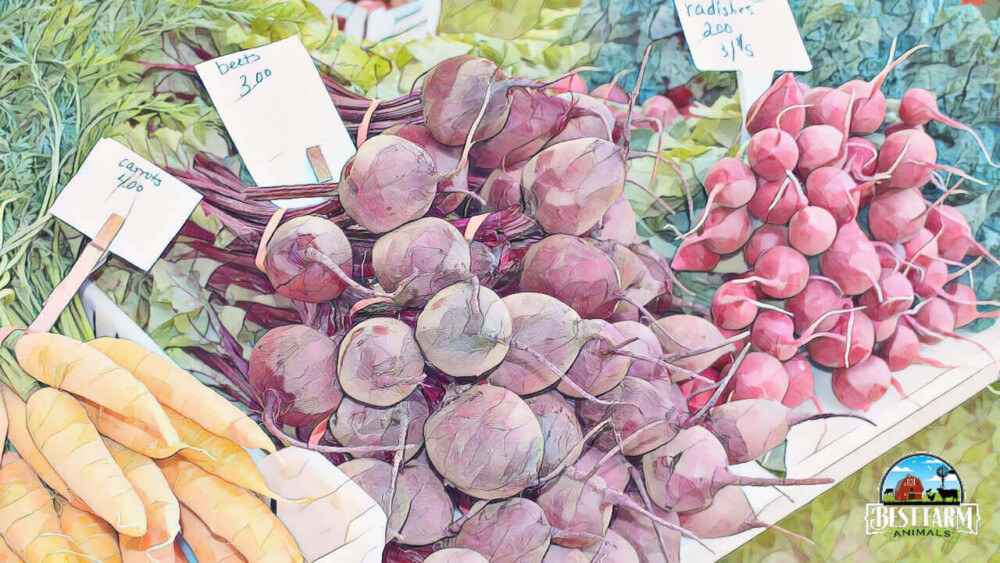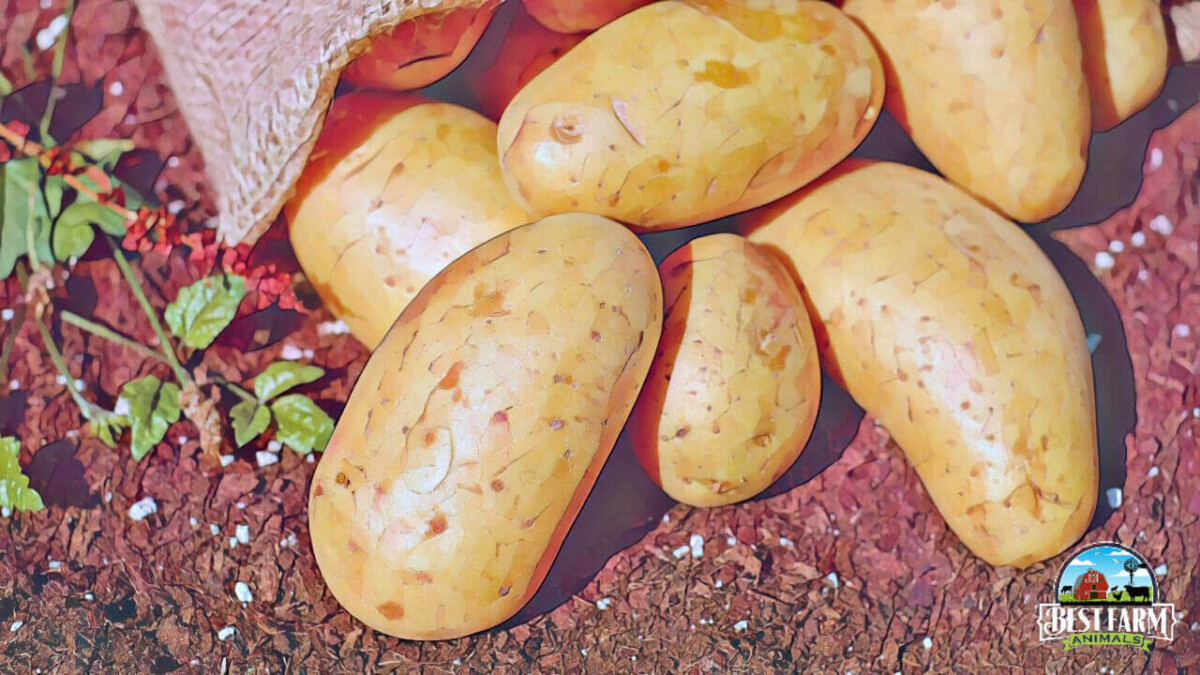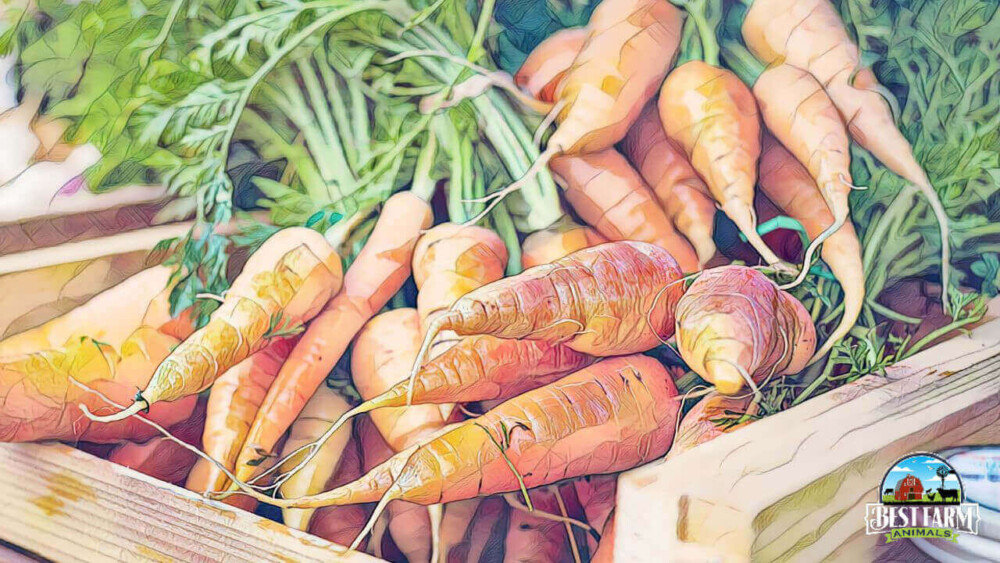Root vegetables are great to produce to keep through winter months and cheap, making them potentially a great way to save on pig feed costs. But some root vegetables, like potatoes, are a nightshade vegetable, which means that they contain alkaloids.
In this article I’m going to cover which root vegetables are healthy for pigs to eat and which ones should be fed in moderation.
If you are have questions on other vegetables, check out this good vegetables for pigs article, which has a complete list of vegetables and whether they are good for mini pigs, potbellied pigs, and all pigs.
Are Carrots Ok For Pigs to Eat?
Pigs can eat carrots, but because of their high sugar, they should only be fed as a treat to pigs. Both the roots and tops (greens) of a carrot are healthy for pigs, but the tops are healthier. When fed in moderation, carrots can provide your pigs with healthy fiber and numerous vitamins, including vitamin A, which pigs need to boost their poor eyesight and keep their reproductive organs functioning properly.
Mini pigs, as well as all pig breeds, can safely eat carrots.
Everything on our farm eats carrots, from chickens and goats to dogs and horses. Our pigs rarely get a look-in except to enjoy the discarded tops. That’s probably a good thing, as the roots have relatively high sugar content.
Are Sweet Potatoes Ok for Pigs?
Pigs can eat sweet potato tubers, either cooked or raw. Although the vines and leaves are also edible, few pigs seem to have a taste for them. Sweet potatoes provide a low-calorie snack for potbelly pet pigs, although some owners recommend only feeding them cooked. Raw sweet potatoes are used extensively in commercial pig farming.
In China, farmers feed their pigs “large amounts of sweet potato at the finishing stage to boost growth.” Other studies also concluded that feeding weaned piglets boiled sweet potato tubers increases their “growth rate and nutrient utilization.”
The safest way to feed sweet potatoes is by boiling them first. Some cultivars have high trypsin inhibitor levels, which may stop your pig from digesting enough protein. Without sufficient protein, your pig will struggle to gain weight. Sweet potatoes make a great treat for your mini pig.
Can Pigs Eat Onions?
Pigs shouldn’t eat onions because these veggies are toxic. Onions’ anti-inflammatory and antioxidant properties may be beneficial, but the disadvantages outweigh the benefits. Onion toxins such as lipid transfer protein, disulfides, and thiosulphates can cause life-threatening onditions such as difficulty breathing and anemia in pigs.
Also, onions make pork bitter and tainted, making it unfit for human consumption. Boiling or cooking onions will not remove the toxicity and may worsen the situation. But why can’t pigs eat onions like humans, despite the two having a similar digestive system? A pig’s body isn’t built to filter out toxins from food. Instead, hogs stores toxins in thor fat stroage systems.
Growing onions away from pig pens or grazing areas is critical for people like me who practice mixed farming. This is because a pig will readily jump to an onion and feed on its leaves as well as the root. Keep an eye out for symptoms of onion toxicity in your pigs, such as diarrhea, vomiting, increased heart rate, nasal congestion, and bluish gums.
Are Beets Ok For Pigs to Eat?
Pigs, including mini pigs, can eat raw beets safely, but they may not like how fibrous they are. It’s better to cook beets, feed them young and tender, or chop them up to make them more chewable. They can also eat beet tops, including greens, leaves, and beet pulp. Pigs can also eat frozen and steamed beets. Beets provide high levels of folate and potassium and Vitamins A and C.
Sugar beets (mangels) are often used for pig feed. The University of Alberta found that feeding pigs sugar beet pulp can help improve their gut health. Most pigs love beets, and most pig owners love the pink noses they get from eating them. They are also a good source of energy.

Can Pigs Eat Radishes?
Pigs can eat every part of the radish, from crunchy fruit to hairy stems and rosettes of oblong leaves. All parts of the plant are healthy and nutritious, although the leaves contain nearly six times more vitamin C than the root. Pigs should only eat radish in small quantities as too much vitamin C can cause bladder stones.
Some commercial farmers grow fields full of forage radish for their pigs. Pigs love rooting around in a pasture full of radishes, but if that’s not an option, a handful of this root vegetable, freshly picked, will go down a treat. Mini pigs usually love radishes as a treat.
Pigs can benefit greatly from eating radishes in their entirety, including the leaves, stems, and the fruit-like roots. Radishes are high in vitamins A, C, and B6. Radishes contain high levels of calcium that pigs need for bone strength, growth, and weight gain. They also contain niacin and minerals like magnesium, phosphorus, calcium, and potassium. Raw radishes are typically 95% moisture, which aids in hydration during the summer or dry months.
They also contain carbohydrates and protein, which are essential for growth, as well as fiber, which aids digestion in pigs. When the weather is nice, I let my pigs roam freely and discovered that they enjoy eating radishes that they dig up themselves. Our weaners and growers enjoy munching on radish leaves containing more vitamins than the roots.
While radishes are healthy, delicious, and completely safe for pigs, they can cause problems if consumed excessively. Because of the high water content, eating too many radishes can cause diarrhea and digestive problems. Pigs should be given radishes as a treat, not as a replacement for their main diet.
The Dangers and Benefits of Feeding Pigs Potatoes
Can pigs eat potatoes? Pigs can eat potatoes safely, provided they’ve been cooked or dried beforehand. Raw potatoes contain a lot of starch, which pigs find difficult to digest. Green potatoes are potentially dangerous to pigs because of their solanine content.
Potatoes have a lot of potential benefits for pigs, but you need to select and prepare them carefully before feeding them. Pulling potatoes out of the ground and tossing them to your pigs can cause health issues for pigs, especially sows.
Pig farmer Valerie Root found this out the hard way. After being given tonnes of potatoes, she fed them raw and then cooked to her pigs.
The potatoes ran out just a few weeks before her sows were due to farrow. Only then did she realize what a terrible mistake she’d made. Of the 108 piglets born that year, only 21 survived birth. The reason? “We fed too many potatoes to the pigs.”

How to Feed Potatoes to Pigs Safely
Potatoes are tricky little things to include in your pig’s diet, even though they’ve proved to be a great source of energy when fed correctly.
Green potatoes, or ones that have started to shoot, contain high levels of solanine, and you should avoid them at all costs.
Raw potatoes are between 60 and 80% starch, which a pig will struggle to digest. Cooking potatoes helps to break down this starch, making them more digestible.
Even cooked potatoes aren’t as rich in protein and vitamins as commercial pig feeds and, as a result, should only make up around 25% of the pig’s diet.
Pigs will feel full after eating potatoes but won’t get the nutritional variety they need to thrive.
The best way to prepare potatoes for your pigs to eat is by following these steps:
- Remove any green or spoiled parts of the potato, along with any sprouts and new growth
- Either peel the potatoes or rinse thoroughly to remove any dirt and residual chemicals
- Chop the potatoes into small pieces to prevent choking
- Boil the chopped potatoes for 15 to 20 minutes
- Drain and discard the water you boiled the potatoes in as it may contain harmful substances
- Allow the potatoes to cool before feeding
- Feed cooked potatoes the same day; otherwise, they may start to spoil.
Some pig owners recommend feeding boiled potatoes to both piglets and sows, saying it improves “metabolic processes and productivity.”
Never feed your pig any part of the plant other than the ripe potatoes, as these contain solanine which is toxic to pigs.
Potato Chips are Better for Pigs than Humans
Commercial farmers feed their livestock all kinds of weird and wonderful things. Who can forget the truck full of skittles that overturned on its way to a dairy farm?
Researchers have been conducting studies on the benefits of feeding potato chips and chip scraps to growing meat pigs since 1998.
The most recent study, conducted by researchers at The Ohio State University in 2000, found that potato chip scraps “can be an effective substitute for corn in the diet of nursery and growing and finishing pigs.”
According to the animal nutritionist Sha Rahnema, potato chips accelerate weight gain in young pigs because the oil in chips gives them more energy than they get from a traditional corn-based diet.
There is also evidence to suggest that including potato chips in meat pigs’ diets improves the meat’s taste and quality. Potato chips contain around 33% fat, making them notoriously bad for humans, but they give piglets the energy they need to pack on the pounds.
For the best results with growing meat pigs, replace 12.5% of the pig’s corn feed with potato chips, and you can significantly reduce the number of days it takes for that pig to reach market weight.
While suitable for meat pigs, potato chips could prove too fattening for pet mini pigs and potbellies, so they should only be fed as occasional snacks rather than part of their daily diet.
Sweet Potatoes are Healthy Treats for Pigs
Unlike the other vegetables discussed here, sweet potatoes do not belong to the nightshade family nor contain any solanine.
Sweet potatoes, or yams, are members of the Morning Glory family and are perfectly safe for pigs to eat. Even the runners or vines benefit pigs, although mine aren’t particularly interested in them.
Sweet potatoes are highly nutritious and provide pigs of all types with a wide range of health benefits. High in vitamin A, they boost the immune system, stimulate growth, and support reproductive function. They also contain an assortment of B complex vitamins that pigs need for energy metabolism.
Sweet potatoes are one of the most nutritious vegetables you can feed a pig, especially when offered raw. Unfortunately, sweet potatoes are also quite dense and tough, so they require a lot of chewing. The best way to feed your pig sweet potatoes is to chop or grate a few into his daily feed. This preparation will make them easier to chew and digest.
Cooked sweet potatoes are softer and easier to eat, but the cooking process dramatically reduces their nutritional value.
Can Pigs Eat Yams?
Pigs eat every component of yams. Yam leaves, vines, fleshy stems, and the yam itself are all edible to pigs. Yams are high in antioxidants, potassium, carbohydrates, fiber, and vitamin C. They also contain calcium, magnesium, iron, and vitamin B6.
Scientific studies show that yam peel meal significantly improves the pigs feed efficiency, rate of gain in body weight, and overall live weight. The higher percentage of carbs in yams make them an excellent source of energy to pigs. A disadvantage of yams is that they don’t contain as much vitamin A and C as sweet potatoes..
Additionally, I always cook or boil my yam roots before giving them to my pigs because raw yams contain toxic, naturally occurring proteins, such as discorin. These toxins can harm the respiratory system and cause digestion problems, stomach issues, and even death in some pigs. So, thoroughly peeling and cooking yams will remove any harmful substances.
Without a doubt, yam peels are nutritious for my pigs, and the mini pigs enjoy them more. But to get the most out of these yam tubers, I cut them into very small pieces and thoroughly boil or cook them before feeding them to my pigs.
My Most Used Pig Supplies
This list contains affiliate products. Affiliate products do not cost more but helps to support BestFarmAnimals and our goal to provide farm animal owners with accurate and helpful information.
Purina Pig Chow will last well (or Mazuri is popular, but I haven’t tried it), and the stainless steel non-skid bowls that will help keep the mess down.
A pig blanket to keep her warm. This one also has bright colors and helps to provide rooting without the destruction.
Pig Harness for walking and handling your pig. There are a lot to choose from, but this one is pretty easy to use. If you want one that has a separate leash, this looks like a good one.
A large crate for keeping her safe in your house at night and when you leave the house. This is essential. You’ll also want a litterbox, and I like mine with a lid for nighttime. Pine shavings are best, and you may be able to find them in larger quantities locally.
When you have accidents, Odoban will help eliminate odors. When you are potty training, these floor pads work great for keeping your house clean while training her to go in certain places.
You’ll also want an outdoor house to keep her warm when she gets outside time, an essential part of her development.
Dewormer- Ivermectin is the primary dewormer I use, although I do rotate with a non-ivermect ingredient once so that the worms don’t get immune to it.

